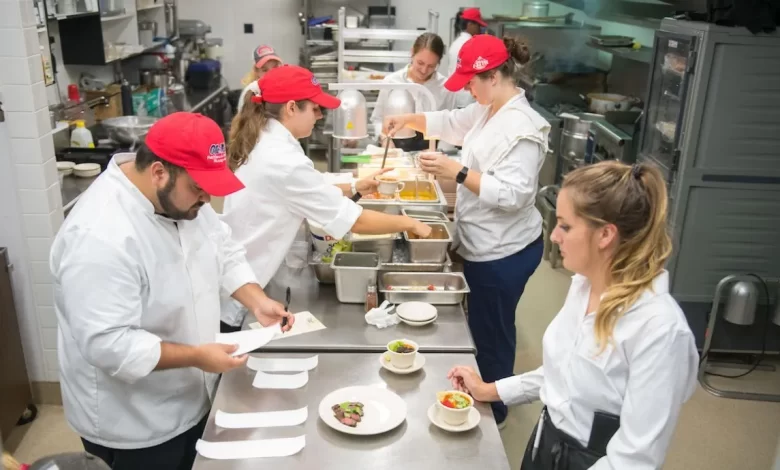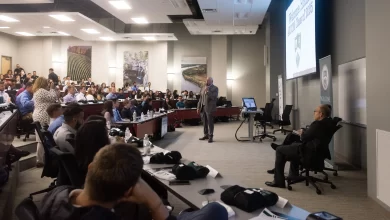The Comprehensive Bachelor of Science in Hospitality Management Curriculum

The Bachelor of Science in Hospitality Management curriculum designed to equip students with the essential knowledge and skills required to thrive in the dynamic hospitality industry. This degree program combines theoretical knowledge with practical experience. Preparing graduates for a wide range of careers in hotels, resorts, restaurants, event planning. and other related fields. Let’s explore the key components and courses included in this comprehensive curriculum.
Core Curriculum
1. Introduction to Hospitality Management
This foundational course provides an overview of the hospitality industry. including its history, structure, and current trends. Students learn about various sectors within the industry. such as lodging, food and beverage, travel and tourism, and event management.
2. Hospitality Marketing and Sales
Understanding how to market hospitality services is crucial. This course covers marketing principles, sales techniques. and strategies tailored to the hospitality industry. Topics include market segmentation, branding, advertising, and customer relationship management.
3. Financial Accounting and Analysis
Financial acumen is vital for hospitality managers. Students learn the basics of accounting, financial statements, budgeting, and financial analysis. This course helps students develop the skills to manage budgets, forecast revenues, and control costs.
4. Hospitality Law and Ethics
This course explores the legal and ethical issues in the hospitality industry. Topics include contracts, liability, employment law, and ethical decision-making. Understanding these concepts helps future managers navigate complex legal environments and uphold ethical standards.
5. Food and Beverage Management
Managing food and beverage operations is a significant aspect of the hospitality industry. This course covers menu planning, food production, cost control, and service quality. Students also learn about food safety regulations. and best practices in kitchen and dining room management.
6. Lodging Management
Focused on the hotel and lodging sector. this course teaches students about front office operations, housekeeping, property management systems, and guest services. Students gain insights into the operational challenges. and strategies for maintaining high standards in lodging facilities.
7. Human Resource Management in Hospitality
Effective human resource management is crucial for maintaining a motivated and efficient workforce. This course covers recruitment, training, performance management. and employee relations within the hospitality context. Students learn to create positive work environments and develop leadership skills.
8. Event Planning and Management
Events are a significant revenue stream in the hospitality industry. This course covers all aspects of event planning, including venue selection, budgeting, logistics, marketing, and post-event evaluation. Students learn to manage different types of events. from corporate meetings to social gatherings.
Specialized Electives
1. Sustainable Tourism and Hospitality
With the growing emphasis on sustainability. this elective focuses on sustainable practices in tourism and hospitality. Topics include operations, sustainable tourism development, and corporate social responsibility. Students learn to install strategies that cut environmental impact and promote sustainable growth.
2. International Hospitality Management
This course prepares students for global careers by exploring international hospitality markets, cultural differences, and global trends. Students gain an understanding of how to manage hospitality operations in diverse cultural settings and navigate international business environments.
3. Hospitality Technology and Innovation
Technology plays a crucial role in modern hospitality management. This course explores the latest technological advancements and innovations in the industry. Topics include property management systems, customer relationship management software. and the use of social media and mobile applications in hospitality.
Practical Experience
1. Internships
Internships are a critical component of the Bachelor of Science in Hospitality Management curriculum. They provide students with hands-on experience in real-world settings. allowing them to apply theoretical knowledge to practical situations. Internships also offer valuable networking opportunities and can often lead to job offers upon graduation.
2. Capstone Projects
Many programs include a capstone project in the final year. where students work on a comprehensive project that integrates all aspects of their learning. This could involve developing a business plan, conducting market research. or solving a real-world problem for a hospitality organization.
3. Field Trips and Industry Visits
To enhance practical learning, students often take part in field trips and industry visits. These excursions provide insights into the daily operations of various hospitality businesses and offer opportunities to interact with industry professionals.
Soft Skills Development
Also to technical knowledge, the Bachelor of Science in Hospitality Management curriculum emphasizes the development of essential soft skills, including:
Communication Skills:
Effective communication with guests, employees, and stakeholders is critical in the hospitality industry. Courses and activities focus on verbal and written communication, public speaking. and interpersonal skills.
Leadership and Teamwork:
Students learn to lead teams, manage conflicts, and collaborate. Leadership courses and group projects help students develop these crucial skills.
Problem-Solving and Decision-Making:
The hospitality industry often requires quick and effective problem-solving. Courses and simulations help students develop their analytical and decision-making abilities.
Customer Service Excellence:
Providing exceptional customer service is at the heart of hospitality. Students learn techniques for delivering high-quality service and handling customer complaints and feedback.
Career Opportunities
Graduates of the Bachelor of Science in Hospitality Management program have a wide range of career opportunities available to them, including:
– Hotel and Resort Management
– Restaurant and Food Service Management
– Event Planning and Coordination
– Tourism and Travel Services
– Casino and Gaming Operations
– Cruise Line Management
– Hospitality Consulting
– Marketing and Sales in Hospitality
The hospitality industry offers a dynamic and rewarding career path with opportunities for growth and advancement. The comprehensive curriculum of the Bachelor of Science in Hospitality Management ensures that graduates are well-prepared to meet the challenges of this exciting field.
Conclusion
The Bachelor of Science in Hospitality Management curriculum is a well-rounded program that combines theoretical knowledge with practical experience. It prepares students for successful careers in various sectors of the hospitality industry by providing a strong foundation in management principles, financial acumen, marketing strategies, and operational skills. With a focus on both hard and soft skills, this curriculum equips graduates to excel in the ever-evolving and competitive hospitality landscape. Whether aspiring to manage a luxurious hotel, run a bustling restaurant, or plan unforgettable events, students of this program poised to become leaders in the hospitality industry.





